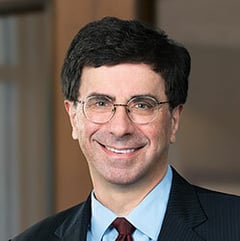

Practice Expertise
- Bankruptcy, Restructuring, and Creditor's ...
- Banking & Financial Institutions
- Bankruptcy and Creditors' Rights for ...
- Appellate
Areas of Practice
- Appellate
- Banking & Financial Institutions
- Bankruptcy and Creditors' Rights for ...
- Bankruptcy, Restructuring, and Creditor's ...
- Banking & Financial Institutions
- Bankruptcy, Restructuring & Creditor's ...
- Bankruptcy, Restructuring, and Creditor's ... View More
Profile
Solving clients' bankruptcy and other insolvency-related problems
Christopher Combest seeks practical, business-aware solutions to clients' insolvency-related problems, from the most straightforward to the most complex. During over 25 years of practice, Chris has represented most parties to insolvency cases, including:
- Debtors, trustees and receivers
- Secured lenders under Article 9 of the Uniform Commercial Code
- Suppliers and other unsecured creditors
- Landlords
- Purchasers of assets out of bankruptcy estates
- Defendants in bankruptcy avoidance actions
That experience allows Chris to resolve a client's issues with insight gained from having dug in on all sides of those issues. He understands the differing opportunities, incentives and pitfalls created for clients by the complex requirements of insolvency law. At the same time, Chris works with each client to balance the benefits of an approach against the costs of pursuing it.
Bar Admissions
- Illinois
- Massachusetts
Education
- University of Washington (M.F.A., 1985)
- Yale Law School (J.D., 1994)
- Yale University (B.A., summa cum laude, 1982)
- Phi Beta Kappa
Areas of Practice
- Appellate
- Banking & Financial Institutions
- Bankruptcy and Creditors' Rights for Financial Institutions
- Bankruptcy, Restructuring, and Creditor's Rights
- Banking & Financial Institutions
- Bankruptcy, Restructuring & Creditor's Rights
- Bankruptcy, Restructuring, and Creditor's Rights
Professional Career
Articles
- "A Simulated Multi-Party Mediation of a Chapter 11 Dispute Arising from (i) a Leveraged-Lease of a Las Vegas Casino and (ii) the Operation of the Claims Limitation under section 502(b)(6)"
- "Back to Nine: Supreme Court Cases to Watch This Term and Next."
- "Battles Begin Early in Chapter 9 Cases"
- "Insolvency Doesn’t Justify Rewriting Agreement to Weaken Creditor’s Rights"
- "Leases and Executory Contracts under the United States Bankruptcy Code"
- "Municipal Financial Distress – Past, Present, and Future"
- "Oh, Just Sign It, Nothing Can Go Wrong: Risks to the Grantor in Pledging Collateral"
- "U.S. Supreme Court Highlights New Concerns in Naming IRA Beneficiary"
- "UCC filings mean what they say, even if a secured party believes otherwise"
- "Unsure at any Speed: Understanding the Rights and Obligations of Suppliers and Other Parties to Contracts with Troubled Companies – Lessons from the Auto Industry"
- Are Inherited IRAs Exempt in Bankruptcy? Seventh Circuit Says "No." Others Say "Yes."
- Before Selling to a Chapter 11 Debtor, Make Sure the Debtor is Authorized to Pay You
- Chapter 11 Debtor Escapes Required Make-Whole Premium in Bankruptcy
- D&O Policies and Advancement of Legal Fees, Chapter 13 of The Bankruptcy Claims Handbook
- First Circuit Bucks Developing Trend; Favors Trademark Owners Over Their Licensees in Bankruptcy – In re Tempnology, LLC
- Fraudulent Transfer Scheme Prevents Discharge of Debtor's Obligation
- Intercreditor Agreements in Bankruptcy: How Intercreditor Agreements shape the proceedings and outcomes for secured creditors
- Lenders Are Entitled to Default Interest in Chapter 11: Ninth Circuit
- Managing Loan Defaults in the COVID-19 Environment
- Protect Liens From Preference Avoidance The Easy Way: Watch Your Timing
- Read the Fine Print Before You Sell Your Bankruptcy Claim
- SCOTUS Holds Bankruptcy Code Waives Tribal Sovereign Immunity: Implications for Tribes as Creditors: Lac du Flambeau Band of Lake Superior Chippewa Indians v. Coughlin
- Seventh Circuit Holds Federal Receiver Not Bound by State Law Priorities for Redeeming Investors
- Supreme Court Highlights New Concerns in Naming IRA Beneficiary
- Supreme Court Makes Bankruptcy Claw-Backs Easier While Protecting Financial Institutions
- Supreme Court Makes it Harder for Trust Beneficiaries to Prove "Defalcation" by Fiduciary in Bankruptcy
- Supreme Court: Bankruptcy Does Not Prevent Licensees from Using Trademarks
- Supreme Court: Denying Request to Lift Bankruptcy Automatic Stay Is Immediately Appealable—So Don’t Wait
- Supreme Court: Filing a Proof of Claim on Time-Barred Debt Does Not Violate Fair Debt Collection Practices Act
- Supreme Court: To Bar Bankruptcy Discharge, Statement of Financial Condition Must Be “In Writing”
- Supreme Court: Chapter 7 Debtors May Not Extinguish Underwater Liens
- “General Growth: Reality Check for Real-Estate Finance Industry?”
- “Recent Cases Suggest Better Practices for Documenting Obilgor Settlements”
- “Safe Harbor” for Transfers to or for Banks May Not Keep Them Safe from Bankruptcy Trustees: Seventh Circuit
- “Seventh Circuit Holds Equity Receivers Not Found by State Law Priorities in Liquidating Hedge Funds”
Seminar
- Business Law Training | Intercreditor Agreements in Bankruptcy: Negotiating Intercreditor Agreements to Shape the Proceedings and Outcomes for Secured Creditors in a Bankruptcy Case
- Business Law Training: Everything Must Go!: Sales of Assets in Chapter 11 Bankruptcy Cases
- Business Law Training: When Bad Things Happen to Good Contracts
Meet our Firms and Professionals
WSG’s member firms include legal, investment banking and accounting experts across industries and on a global scale. We invite you to meet our member firms and professionals.


